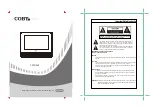
Page 8 — English
EXTENSiON CORD CABLE SizE
Refer to the table below to ensure the cable size of the extension cords you use are capable of carrying the required load.
Inadequate size cables can cause a voltage drop, which can damage the appliance and overheat the cord.
Current in
Amperes
Load in Watts
Maximum Allowable Cord Length
At 120V
At 240V
#8 Wire
#10 Wire
#12 Wire
#14 Wire
#16 Wire
2.5
300
600
1000 ft.
600 ft.
375 ft.
250 ft.
5
600
1200
500 ft.
300 ft.
200 ft.
125 ft.
7.5
900
1800
350 ft.
200 ft.
125 ft.
100 ft.
10
1200
2400
250 ft.
150 ft.
100 ft.
50 ft.
15
1800
3600
150 ft.
100 ft.
65 ft.
20
2400
4800
175 ft.
125 ft.
75 ft.
25
3000
6000
150 ft.
100 ft.
30
3600
7200
125 ft.
65 ft.
40
4800
9600
90 ft.
ELECTRiC MOTOR LOADS
It is characteristic of common electric motors in normal operation to draw up to six times their running current while start-
ing. This table may be used to estimate the watts required to start “Code G” electric motors; however, if an electric motor
fails to start or reach running speed, turn off the appliance or tool immediately to avoid equipment damage. Always check
the requirements of the tool or appliance being used compared to the rated output of the generator.
Motor Size (H.P.)
Running Watts
Watts Required to Start Motor
Repulsion induction
Capacitor
Split Phase
1/8
275
600
850
1200
1/6
275
600
850
2050
1/4
400
850
1050
2400
1/3
450
975
1350
2700
1/2
600
1300
1800
3600
3/4
850
1900
2600
—
1
1100
2500
3300
—
CAUTiON:
Operating voltage and frequency requirement of all electronic equipment should be checked prior to plugging them
into this generator. Damage may result if the equipment is not designed to operate within a +/- 10% voltage variation,
and +/- 3 hz frequency variation from the generator name plate ratings. To avoid damage, always have an additional
load plugged into the generator if solid state equipment (such as a television set) is used. A power line conditioner is
recommended for some solid state applications.
ELECTRiCAL






































